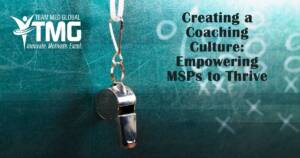 In the high-stakes world of healthcare, success isn’t just about meeting deadlines or ticking off tasks. For Medical Services Professionals (MSPs), the difference between surviving and thriving lies in a workplace culture that champions growth, resilience, and leadership. A coaching culture—where feedback is continuous and development is a shared priority—can transform an ordinary team into one that rises to any challenge. By shifting the focus from management to coaching, MSPs are empowered to innovate, solve problems independently, and grow into the leaders of tomorrow.
In the high-stakes world of healthcare, success isn’t just about meeting deadlines or ticking off tasks. For Medical Services Professionals (MSPs), the difference between surviving and thriving lies in a workplace culture that champions growth, resilience, and leadership. A coaching culture—where feedback is continuous and development is a shared priority—can transform an ordinary team into one that rises to any challenge. By shifting the focus from management to coaching, MSPs are empowered to innovate, solve problems independently, and grow into the leaders of tomorrow.
The Difference Between Coaching and Managing
To start, it’s important to recognize the difference between managing and coaching. Management focuses on overseeing tasks and ensuring that goals are met. Coaching, on the other hand, prioritizes the individual’s growth, asking questions like: How can I help you achieve your full potential? What support do you need to solve this problem? The aim is not to direct but to guide, allowing the MSP to find solutions independently. This kind of guidance encourages a mindset of problem-solving and leadership at all levels.
Why MSPs Benefit from a Coaching Culture
For MSPs, who are tasked with navigating regulatory complexities, handling multi-faceted provider enrollment scenarios, and managing compliance in a constantly shifting environment, having access to a coaching culture can be transformative. Here’s why:
Empowerment Through Feedback: A coaching culture focuses on two-way feedback. MSPs can gain from real-time insights, not just from supervisors but from peers as well. This approach creates an environment where feedback is constructive, ongoing, and focused on growth, instead of being reserved only for performance reviews. It helps MSPs stay ahead of changes in the industry, improving their adaptability and agility.
Boosting Confidence and Leadership: In a coaching culture, the focus shifts from simply meeting the next deadline to developing critical thinking skills. When MSPs are encouraged to explore solutions and drive decision-making, their confidence grows. This fosters leadership abilities, even in junior team members, creating a stronger and more resilient workforce.
Continuous Learning and Adaptation: The world of medical services is dynamic, with regulations and standards continuously evolving. A coaching culture prioritizes continuous learning, ensuring MSPs are always up-to-date on the latest best practices. By focusing on long-term development, coaching ensures that professionals are not just checking boxes but actively seeking improvement and innovation in their roles.
Key Elements to Create a Coaching Culture
Building a coaching culture doesn’t happen overnight. It requires intentional actions and a commitment to fostering an environment of trust, openness, and shared growth. Here are the steps you can take to get started:
Set Clear Expectations Around Development: From day one, make it clear that personal and professional development is not only encouraged but expected. By setting the tone early on, team members know that their growth is a priority and that the organization is invested in helping them achieve their goals.
Provide Training for Leaders: Creating a coaching culture starts at the top. Leaders need training in effective coaching techniques, such as active listening, asking open-ended questions, and providing constructive feedback. It’s about learning how to support team members without micromanaging them. Leaders should also model the behavior they expect to see in their teams, demonstrating a commitment to their own continuous improvement.
Foster Peer-to-Peer Coaching: Peer coaching can be just as valuable as traditional manager-to-employee coaching. Encourage team members to share their expertise and experiences with each other. This not only builds a sense of camaraderie but allows MSPs to learn from diverse perspectives. Peer coaching also distributes the responsibility for growth across the entire team, making development a shared goal.
Celebrate Successes and Failures Alike: In a coaching culture, failure is seen as an opportunity for learning, not a reason for punishment. Encourage MSPs to take risks, innovate, and reflect on what worked and what didn’t. Celebrating successes and failures alike reinforces the idea that growth comes from both triumphs and setbacks.
Regular Check-ins and Follow-Ups: Establish a routine of regular check-ins to ensure that coaching efforts remain on track. These can be one-on-one meetings or team sessions where progress is discussed, and feedback is shared. The key is consistency—by regularly revisiting goals and challenges, you maintain momentum and keep development at the forefront.
Cultivating a Thriving Future for MSPs
A coaching culture not only enhances the individual capabilities of MSPs but also strengthens the entire organization. When everyone is focused on learning, growth, and leadership, the team becomes more resilient, adaptable, and prepared to navigate the complexities of medical staff services. Ultimately, by creating an environment that nurtures continuous improvement, you’re setting your MSP team—and your organization—up for long-term success.
Developing a coaching culture may take time, but the investment is well worth it. It leads to empowered MSPs, stronger teams, and a workplace where everyone is encouraged to reach their full potential.

